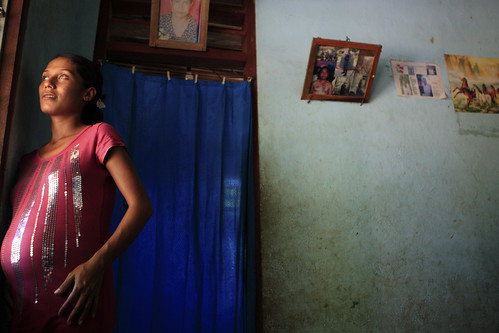Safer birth practices a must for Timor-Leste
Posted on | augustus 15, 2011 | No Comments

A pregnant woman in Timor-Leste looks out her window. Photo: United Nations Population Fund
In Timor-Leste women have an average of 7 children, yet in a country with birthrates so high care for maternal or newborn health and safety is lacking. In a country were babies are far from the rarity, health problems for mother and babies are also far from rare. Due to the lack of adequate prenatal and postnatal care many mothers not only suffer health ramifications, but so do their newborn’s, many who are born with health complications and birth defects.
Additionally traditional birth practices often continue in practice and thus bring harm to both mother and chidl. Such practices inclued; Pregnant women will lie and sleep next to a fire for months with the belief that the fire’s heat will wash away all the dirt and impurities from the babies’ blood, Macu Guterres, coordinator for the National Breastfeeding Association, told the UNHCR, that this practice can harm both the mother and the baby and cause the child can develop asthma. Another belief is that the milk a mother produces immediately after birth, will harm the baby if consumed, and therefore newborns are often fed a substance made with honey and water, which is believed to wash away all the dirt from the baby’s intestines and blood.
The fight for safer birth practices in the country are far from new, however while it sometimes appears that change is slow despite some efforts by international health organizations in the last 5 years, one must look at the country’s history and lack of infrastructure, especially regarding healthcare. In the 1990s, the country was suffering a violent occupation from Indonesian, at that time the under-five mortality rate for children was 184 per 1,000, according to the UN Children’s Fund (UNICEF), the figure had decreased significantly by 2009 to 56.
In the 2004 the Health Alliance International (HAI) released their Fourth Annual Report for Improving Maternal and Newborn Health in East Timor (Timor-Leste), maternal mortality was estimated at 800 per 100,000 live births, infant mortality was 80-90/1000 live births, and 120 children per 1000 died before reaching age five. Additionally the utilization of health services for any purpose in the country was also very low. Only about half of women receive any antenatal care during pregnancy, the use of a skilled birth attendant was less that 20%, and fewer than 10% of births occurred within a registered health facility. Nonetheless while maternal and newborn care was low, the country continued to hold on to a significantly high fertility rate of 7.8. It was no shock that the country’s level of accessing any family planning methods remained dramatically low at 9%.
Following their critical assessment and report HAI established 2 Birth Friendly Facility (BFF), which are designed like a traditional Timorese house and are located in close proximity to a health facility. The BFF’s were established to “provide a comfortable, culturally acceptable place for women to come to deliver their babies with a skilled birth attendant, typically a midwife”. However while the evaluation’s of the facilities by all actors using and working in the BFF’s was very positive, there was still a lack of will by a vast majority to utilize a BFF lack of preparation for the birth itself. HAI has since made efforts to ‘promote and train on creating a birth plan and the importance of having a skilled birth attendant at delivery’, much of which has been pushed via educational videos (HAI).
41-year-old mother of eight, whose newborn has an imperforate anus (the passage is closed) and appears to have Down’s syndrome. “The health workers told me before that it was dangerous to my health to have many children and that it would be difficult to feed all of them, but I didn’t agree.” Now, after her latest birth, she has accepted contraception.
However she is not alone and young mothers are also fighting against many methods, such as Domingas dos Santos, 25, is four months pregnant; she already has children of eight months, two, four and five years old. “I’ve been told about birth control and family planning but I’m not interested,” Dos Santos says. (IRIN).
Last month, the Timor-Leste government took a big step forward in the Strategic Development Plan 2011 – 2030, which was drafted by the Prime Minister’s office. The plan states that by 2015 approximately two-thirds of pregnant women in the country are to receive regular pre-natal check-ups and have the assistance of a government-trained health worker when they give birth.
Therefore it appears that the biggest barrier between mothers and safer birth practices is not only access to health facilities, but also a lack of education and understanding on Maternal health, safe birth practices, and family planning. Increased awareness and access to both facilities and birth control methods are a must if one is to see the standard of heath for both mothers and their babies to improve, as well as to ensuring that families are better able to care and feed for themselves. However as many women are reluctant to utilize birth control methods and seek alternative practices such as; birth spacing, which according to USAID studies show birth spacing, the practice of regulating the intervals between pregnancies, can significantly reduce both maternal and infant health risks. Additionally medical assistance the training of midwives, training of hygiene methods for at home deliveries is a must to bridge the gaps to safer birth practices.
 AUTHOR: Cassandra Clifford
AUTHOR: Cassandra Clifford
URL: www.bridgetofreedomfoundation.org and http://children.foreignpolicyblogs.com
E-MAIL: Cassandra [at] btff.org
Tags: BFF > birth > birthrates > HAI > health > IRIN > postnatal > prenatal > Timor > UNHCR > Unicef > USAID
Comments
Leave a Reply




 Reut Institute: Israeli Boycott law may backfire
Reut Institute: Israeli Boycott law may backfire












